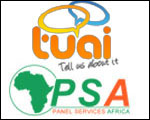The current race to the White House in the USA has been dramatic in many ways, and news about that election is likely to dominate international headlines until November. In particular, in the last UK general election, pollsters got it horribly wrong and they misfired again in the Brixit forecasts, based on polls that proved to be mainly wrong. There may not be the same level of poll fixation in South Africa, but it’s certain that many people are deeply concerned about the outcome, and what that may mean for the future in South Africa.

One of the things that people look for in the media coverage in the US – more so perhaps than anywhere else, and certainly more intensely so than has traditionally been the case in South Africa – has been ‘what the polls are saying’. In addition to headline reports and discussions about ‘how accurate the polls are’ (or how accurate they were after the event), there are also discussions about how political polling as a political barometer is conducted in an environment where communication channels are changing rapidly, and where it is important to find appropriate ways to reach representative samples of the voting public who can participate in quick turn-around polling projects.
Political polling is in many ways no different than other quick turn-around marketing research projects, but at the same time it has also become a highly specialised field where the race is often to squeeze the last drop of credibility out of available resources.
Looking at polls from a methodological point of view, one could argue that they are about as accurate as throwing darts at a newspaper front page, simply because nobody knows how many people will vote, let alone which candidate they will vote for.
A large part of the reason for this is that their measurements are based on the fiction of attempting to represent a population using statistical theory that assumes a random probability where each element in the population has a known (usually equal) chance of being selected.
In the early days of polling in both the US and UK, polls have traditionally been considered reasonably accurate. But this assumption no longer holds because telephones (AKA landlines), which were almost universally distributed across the population, have been replaced by mobile phones for which random digit dialling doesn’t exist.
So, methodologically, polling is now less reliable because of the lack of a reliable way of randomly accessing a representative sample.
One is to rather measure change directly and preselect people who voted last time and intend to vote this time. In other words, panels may be part of the answer. Online panels do not represent the total universe, at best only 45% (the portion of the population that accesses the internet), but measure change of choice by individual over a period of time.
A second is to measure volatility of intention of segments of the population. It means measuring to what extent will people vote differently from the way that they previously voted, rather than just who they intend to vote for. To illustrate this idea, Panel Services Africa used their panel to measure peoples’ Intentions using this approach. Launching on Monday, 25 July the results presented below were obtained on Tuesday, 26 July.
While only 301 panellists were interviewed, the results suggest that a high voter turnout amongst people who access the internet regularly would favour the DA…
*Note that Bizcommunity staff and management do not necessarily share the views of its contributors - the opinions and statements expressed herein are solely those of the author.*

This survey was carried out by Panel Services Africa on their premium online research panel, TellUsAboutIt, comprising 40,000 registered online users.
Contact Claire Heckrath (087 150 5298) for more information, or az.oc.acirfasecivreslenap@ofni.